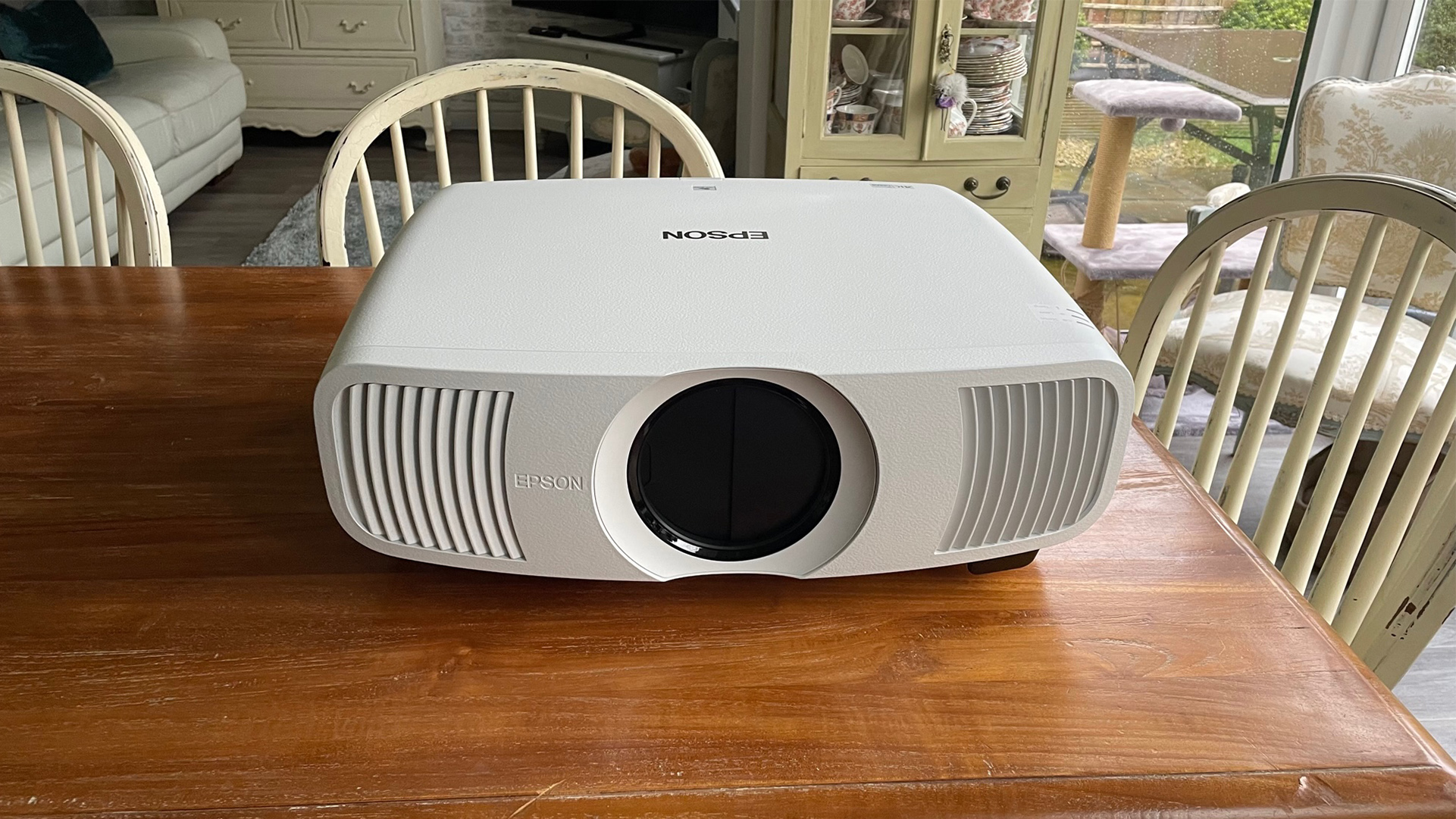
Everything about the Epson EH-LS11000W tells you it wants to be taken very, very seriously. Its colossal bodywork, for starters, is far too big to be mistaken for some namby pamby casual ‘home entertainment’ projector. This beast is intended for a full-on permanent installation in a dedicated home cinema room.
It weighs a tonne, too, pointing towards some uncompromising build quality and components, as well as hopefully indicating a desire to run as quietly as possible so as not to disturb your serious viewing of serious movies on serious movie nights.
Its massive lens screams ‘you will see ALL the details of your 4K films’, meanwhile, and its menus are packed with premium features and professional calibration aids.
Even the fact that it doesn’t carry any built-in sound system underlines the LS11000W’s commitment to doing a proper home cinema job. Does it actually ultimately have the cinematic performance chops, though, to deliver a strong walk to go with its undoubtedly good talk?
Price
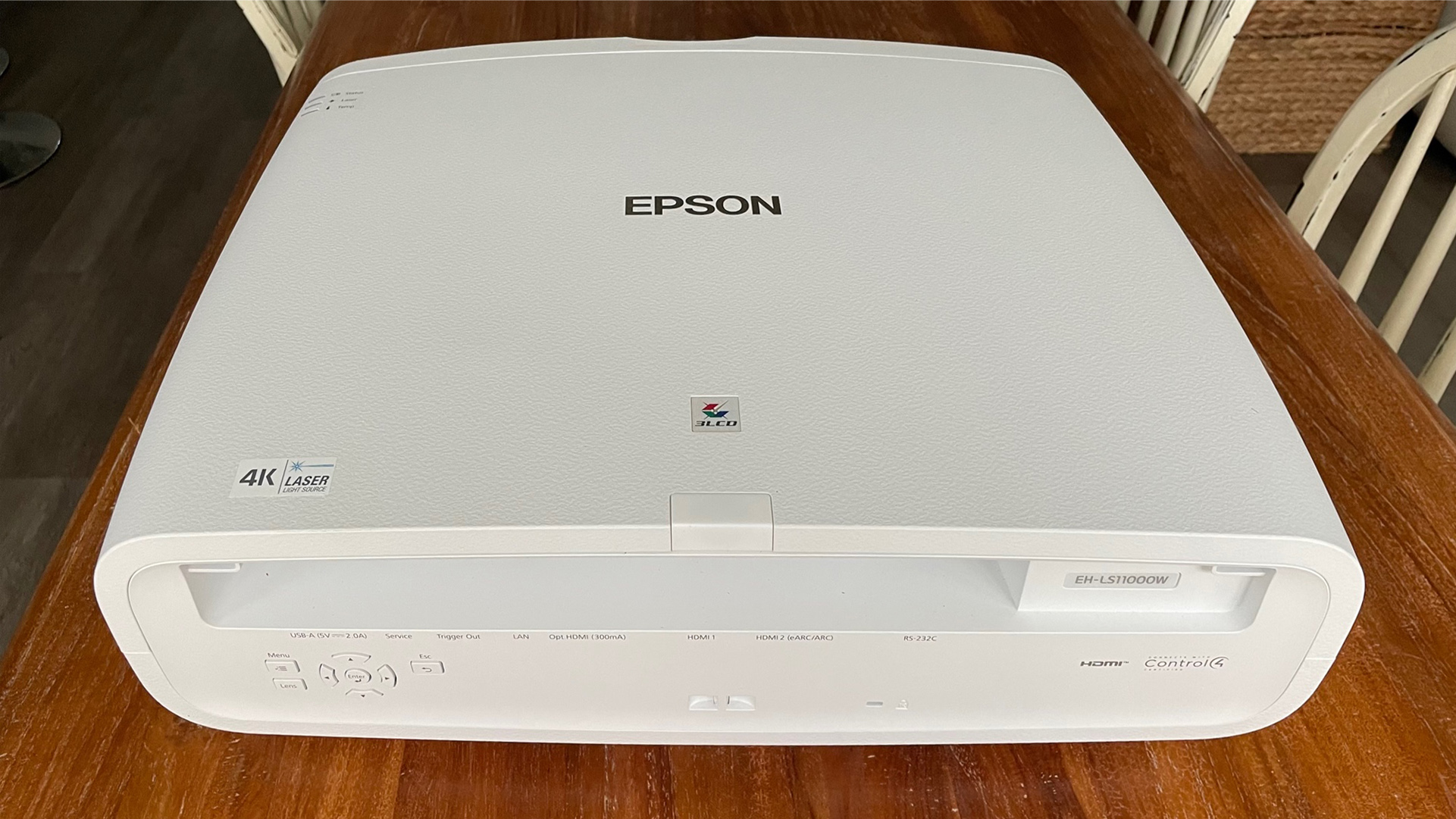
The LS11000W’s £2999 / $3999 price actually feels surprisingly light for a projector so keen to make you aware that it’s a relatively high-end projector focused very much on home cinema rather than more generic home entertainment thrills.
That price seems to be a relatively recent development, it has to be said; while most retailers now ship it for £2999 in the UK, it’s still listed on Epson’s own website at £3449. But even at its Epson official price it’s still a far cry from figures such as the £8500 / $8995 needed for Leica’s recently reviewed Cine 1 UST projector, the £4999 / $5998 needed for a Sony VPL-XW5000ES 4K laser projector, or the £8999 / $9000 required at the time of writing to secure JVC’s laser-based DLA-N7.
In other words, if the LS11000W can deliver as good a performance for its money as its uncompromising appearance suggests Epson thinks it can, it could make that £2999 / $3999 price look very reasonable indeed.
Design
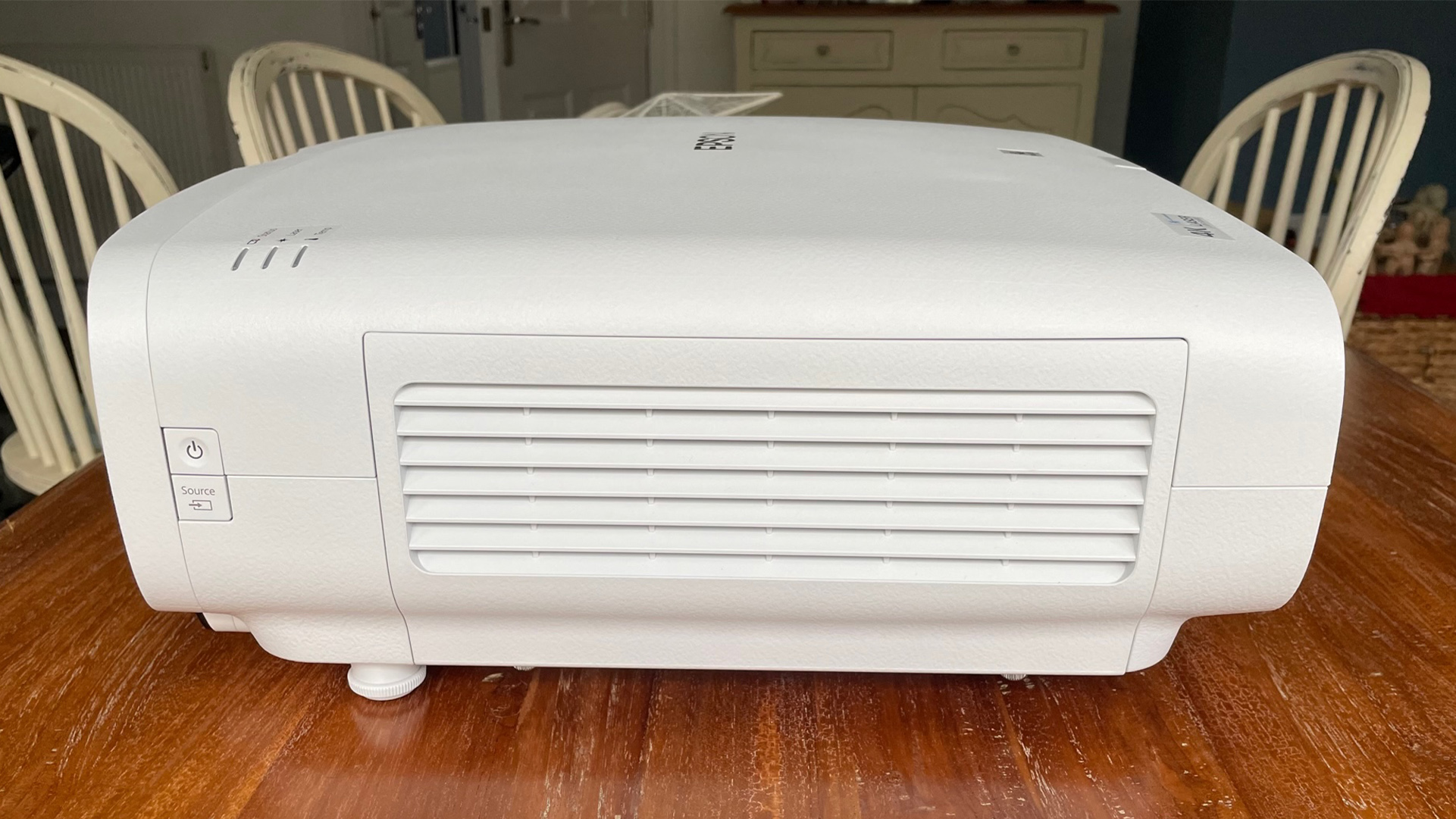
While the Epson EH-LS11000W’s mammoth form doesn’t exactly blend into your room, it’s actually quite attractive in a bulbous kind of way. Its massive centrally mounted lens looms at you like the bigger brother of 2001: A Space Odyssey’s HAL, the rounded edges and front panel make it look almost organic in nature, and the gently arced grille lines that form the front of the projector’s venting system to either side of the lens throw in a hint of sci-fi on top of all the other drama.
The projector’s bodywork is wrapped in a lovely rough, textured finish, too, that emphasises the supreme build quality.
Aside from a rather unnecessary Epson logo stuck between one of the vents and the lens, the LS11000W also pulls off an engagingly minimalistic pose, bolstered by the way it puts all of its connections and the vast majority of its control buttons on its rear panel.
Putting most of the controls on the back panel means they’re not particularly accessible, but the projector ships with a huge, button-laden remote control that would be very difficult to lose down the sofa and makes the on-projector buttons entirely unnecessary.
As well as being enjoyably, unashamedly huge, the LS11000W’s remote is backlit, reaffirming yet again that this is a projector designed to be used pretty exclusively in a dedicated, blacked-out home theatre.
Features
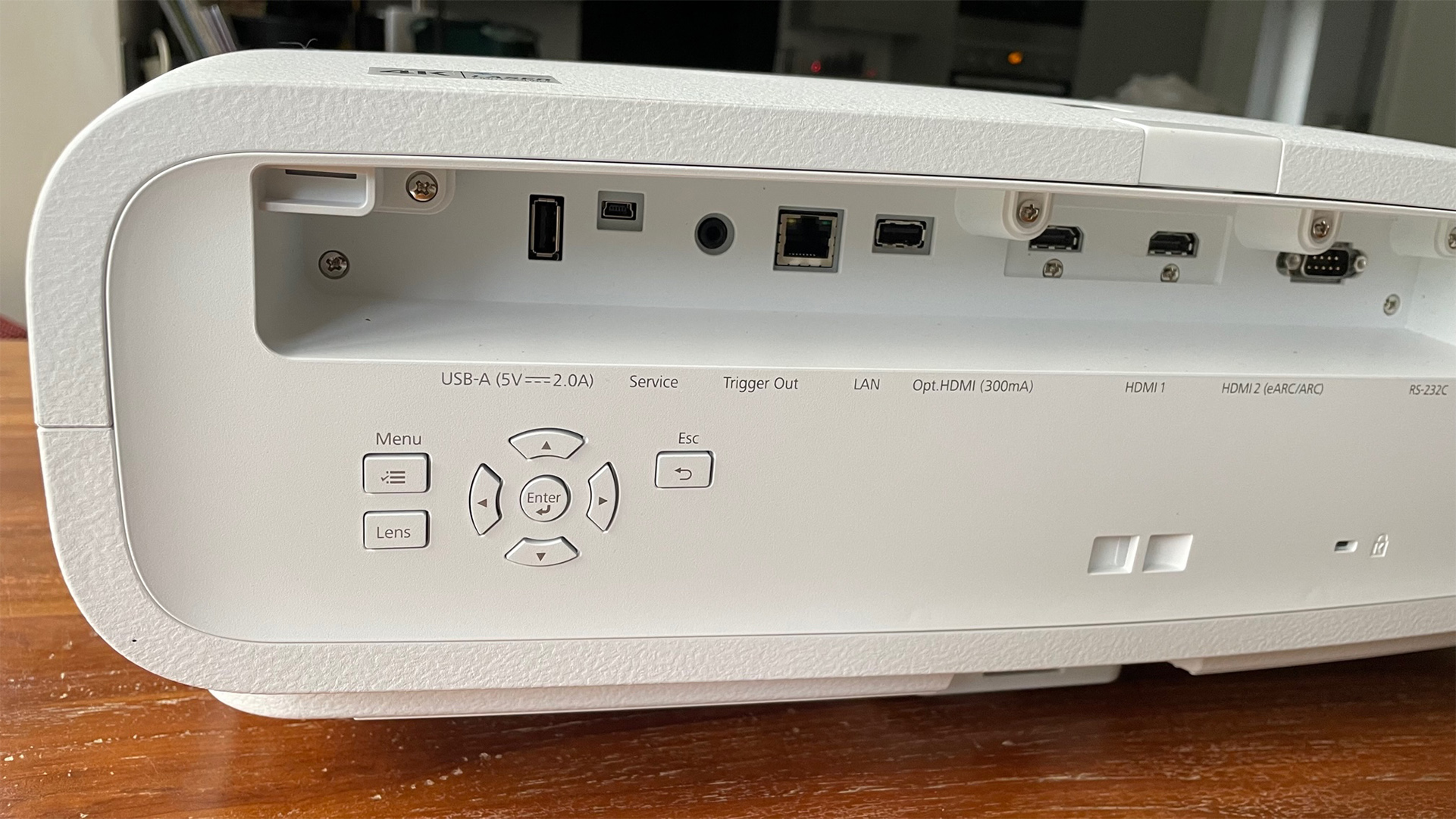
The Epson EH-LS11000W is a standard-throw (rather than ultra short throw) LCD projector designed specifically as a home cinema machine. It’s not a more casual ‘entertainment’ projector. For reasons we’ll get to later it can also be considered a quite serious gaming display, but then the premium gaming and home theatre worlds have become generally pretty inextricably entwined across the TV and projector worlds in recent years.
It uses pixel-shifting technology to deliver 4K images (though this doesn’t make it a truly native 4K projector in the way that Sony’s SXRD models are), and it claims to be capable of hitting a peak light output of 2500 lumens. That’s not as high as the figures quoted by most of the other projectors we’ve tested recently, but far from being a problem, we’re actually pretty OK with it. After all, while the more aggressive ‘light cannons’ that make up so much of the projector world at the moment might do well at punching through ambient light or giving more impact to high dynamic range pictures, they also tend to forget that being able to handle dark scenes and contrast convincingly is also important to a convincing cinematic picture. So hopefully the LS11000W’s more moderate brightness will prove perfectly pitched to help its pictures achieve a good balance between HDR-friendly brightness and cinematic contrast.
The LS11000W’s dynamic iris system claims to be capable of getting a huge 2,500,000:1 contrast ratio out of the projector’s laser-based light engine – though experience suggests that this figure is very much a theoretical one only achievable in very specific conditions rather than it being a reflection of the sort of contrast you might readily expect to see with real-world content.
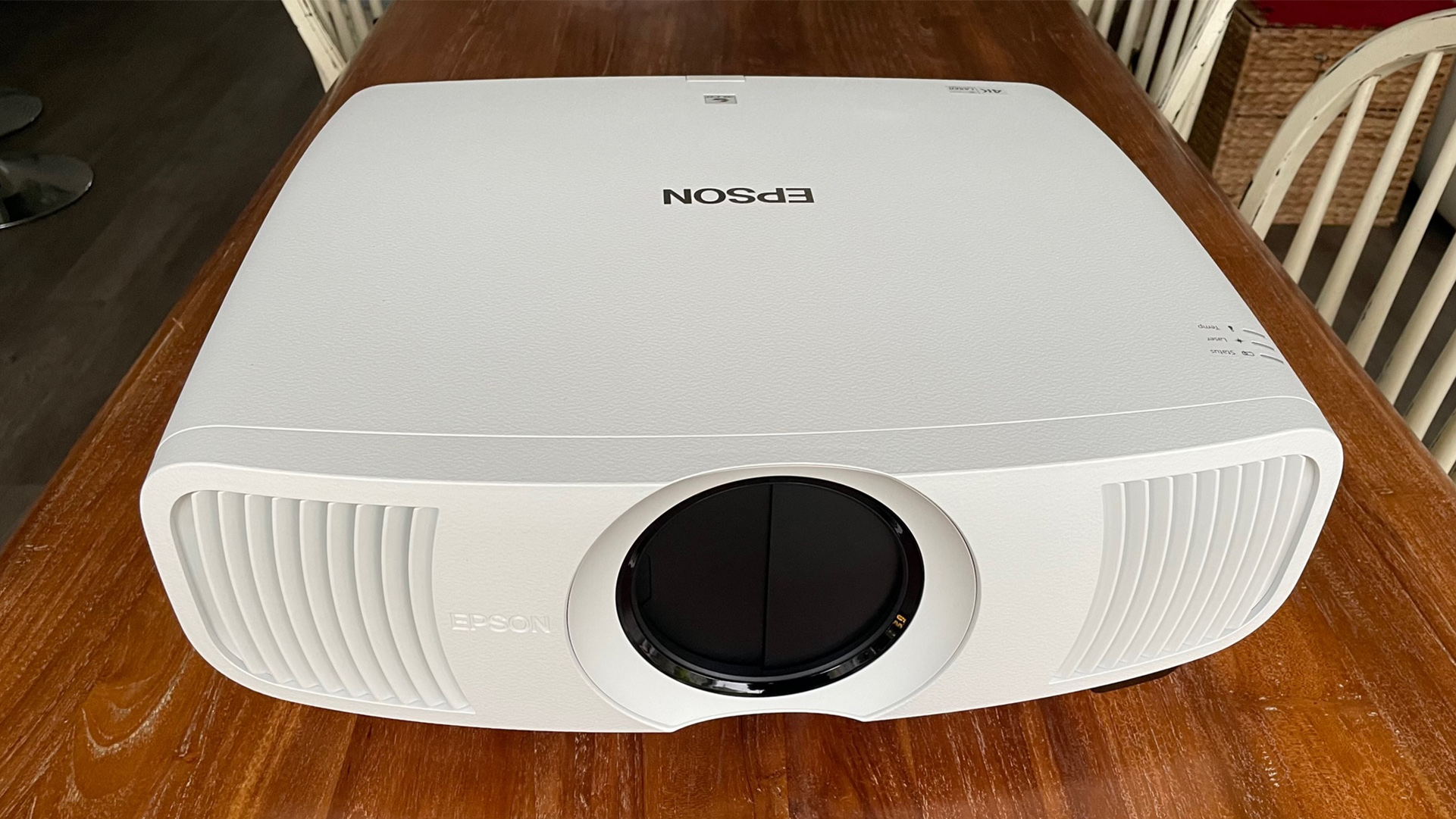
Projector type Laser-lit LCD
Screen size 50-300 inches
Processing Epson ZX picture processor
Native resolution Supports 4K via pixel shifting
Input lag with 60Hz in ’Fast’ processing mode 38.6ms
Dimensions (hwd) 193 x 520 x 447mm
The LS11000W’s large chassis helps it keep running noise down to a very low (for such a bright projector) 22db when it’s running in its Economy mode, while the use of a laser lighting system should see the projector good for at least 20,000 hours of uninterrupted running. There’s no need to regularly replace bulbs as there is with lamp-based projectors.
Setting the LS11000W up is in some ways as easy or hard as you want it to be. Keeping things nice and simple are a comprehensive, tightly calibrated and very flexible set of motorised lens adjustments for focus, zoom and optical image shifting, plus a reasonably well-considered set of picture presets in the LS11000W’s menus. If you want to go further than that, though, there are all manner of more subtle picture tweaks available – enough, in fact, to support a full professional calibration if you want to go that far. There’s even a suite of picture processing options courtesy of Epson’s ZX picture processor.
As we would expect of a premium projector these days, the LS11000W supports HDR playback (with the caveat that HDR was really designed for TVs and panel displays, and so will always present a challenge for projectors). In fact, it goes a little further than most projectors by supporting the HDR10+ type of HDR, with its extra scene-by-scene image data, alongside the basic HDR10 and HLG formats. It doesn’t stretch to HDR10+’s more common Dolby Vision rival, though.
The LS11000W also goes further than most projectors when it comes to gaming, by supporting 4K/120Hz gaming signals over HDMI. The 4K/120Hz handling isn’t backed up by any VRR support, but Epson does provide a ‘Fast’ processing mode that manages to get input lag over the LS11000W’s HDMIs down to a respectable (though not ground-breaking) 38.6ms with 60Hz signals. Gamers should note, though, that the Fast mode inevitably sees the projector toning down or turning off completely some of its image processing tools, resulting in a noticeable drop in contrast.
The LS11000W carries two HDMIs, alongside an RS-232C port, a USB port for powering a streaming stick if you’ve got one connected to one of the HDMIs, a LAN port, and a 12V trigger output. The HDMIs also support eARC technology, where the sound from whatever you’re watching on the projector can be passed out through the projector to an AVR or soundbar.
If you start looking around for an Epson LS11000W to buy, you may notice that it also has a more expensive sibling, the LS12000W. The chief differences between these two models are that the more expensive option claims 2700 lumens of peak brightness versus the LS11000W’s 2500 and that in some territories the LS12000W ships with a ceiling mount bracket.
We should finish this section with two features that the LS11000W does not have, which are any built-in smart features, or any built-in audio. Both are now common with the new breed of ‘living room’ focused projectors. However, such projector-carried smart systems are more often than not seriously flaky, while projector audio systems typically struggle to ‘attach’ their sound to a projector’s pictures convincingly.
In short, we have no problem with the LS11000W focusing all of its efforts and value on just trying to deliver a good cinematic picture and leaving external sources and sound systems to do the rest. Provided, of course, that it does indeed deliver the picture quality goods.
Picture
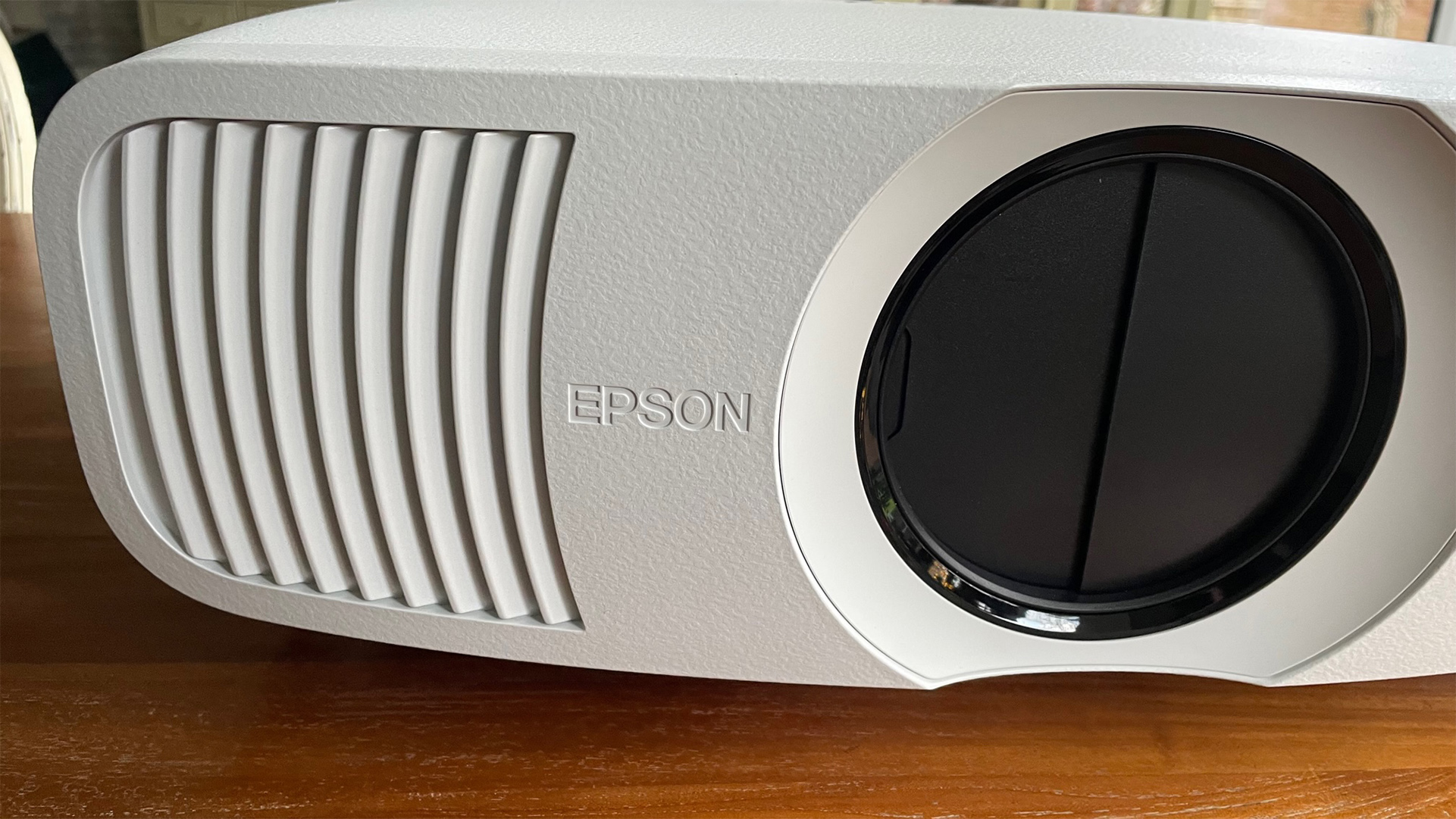
In what’s becoming an almost monotonous trend in the mid and premium projector category at the moment, the Epson EH-LS11000W makes a fantastic first impression before ultimately being knocked back by problems handling dark scenes.
The excellent first impressions are driven by a beautifully bold and rich combination of brightness and colour. Helped, no doubt, by the way LCD projectors are able to maintain the same brightness levels with colours as they are whites, bright movie and TV scenes blaze off the screen in the sort of dark room environments the LS11000W is designed for.
They’re bright enough, in fact, that you could potentially project them onto a grey-tinted screen without them starting to look dull or flat. Something that really might be worth considering with this projector, for reasons we’ll get to later.
Unlike the recently reviewed Epson LS800W ultra short throw projector we tested recently, the LS11000W’s bold and bright colours always look both balanced and natural. Even skin looks realistically toned in a wide variety of in-film lighting environments, as well as being sufficiently full of nuance to ensure that nobody ends up looking like a mannequin or as if they’ve caked themselves in foundation.
The LS11000W’s brightness frequently feels like it’s actually nudging beyond what we’d expect from a 2500 lumens projector, in fact – especially when it comes to the amount of brightness it manages to retain with full-screen bright HDR content. The fact that it does this without leaving colours feeling desaturated means it delivers one of the more potent HDR experiences we’ve seen from a similarly priced serious home theatre projector. At least when it comes to handling the bright end of the extended HDR light spectrum…
The LS11000W also restores our faith in Epson’s LCD pixel shift technology by delivering something resembling a 4K picture after the rather soft-looking LS800W. Native 4K sources look crisp and clean, and while textures might not be quite as pristine as they are on either of Sony’s truly native 4K SXRD projectors, they still look a good notch above mere HD.
Motion with 24p movie sources is handled cleanly enough without motion processing in play to make the inclusion of such processing largely redundant. Though if you do find judder just a touch excessive with some particularly bright 24p movies, the lowest power setting for Epson’s motion processing does an efficient job of mildly smoothing the judder without making the image look processed or like an episode of EastEnders.
The LS11000W’s 120Hz support and decent response time make it an often excellent gaming display. In fact, the pristine joys of 120Hz refresh rates are at their most spectacular when you’re seeing them writ large on the sort of epic screen sizes a home theatre projector such as the LS11000W can satisfy.
It’s also refreshing to be able to enjoy bright highlights in both games and video sources without them being besmirched by so much as a hint of the colour-striping ‘rainbow effect’ that tends to flit over such image content to some extent with pretty much all projectors that use DLP rather than LCD optics.
The LS11000W’s confident picture quality strut starts to stumble, though, whenever it encounters a dark scene. Night shots or dark interiors reveal that in its bid to inject as much punch and colour into bright HDR scenes as its projector optics will allow, it hasn’t been able to hold on to as much control of its light during dark scenes as we’ve seen from some of Epson’s home cinema projectors in days gone by. So scenes that contain lots of content that should look black or something close to it instead tend to look rather grey and misty.
This grey (or, in some presets, bluish) mist effect can cause subtle, faint details in dark scenes to essentially disappear from view, too, leaving the image looking flatter and just generally less convincing than it does during bright scenes. So much so that you almost feel as if you’ve switched to a different projector when a film switches from a bright moment to a dark one.
As a sign of how ingrained this black-level limitation is, there isn’t really any setting (or combination of settings) that makes much difference to it. Pushing up the Auto Contrast setting, for instance, just makes the image look unstable as the lighting system becomes over-eager in its attempts to adjust the light output for each image frame. Also, while the HDR ‘power’ slider setting proves useful in letting you choose your preferred balance between the image’s baseline brightness and how much the projector ‘clips’ (loses subtle details in bright areas), it again doesn’t really make much difference to how grey those dark scenes look.
One other issue with the LS11000W’s playback of HDR is the way dark objects that appear foregrounded against a bright backdrop can look so dark that they actually lose a lot of their definition, leaving them looking like silhouettes.
Verdict
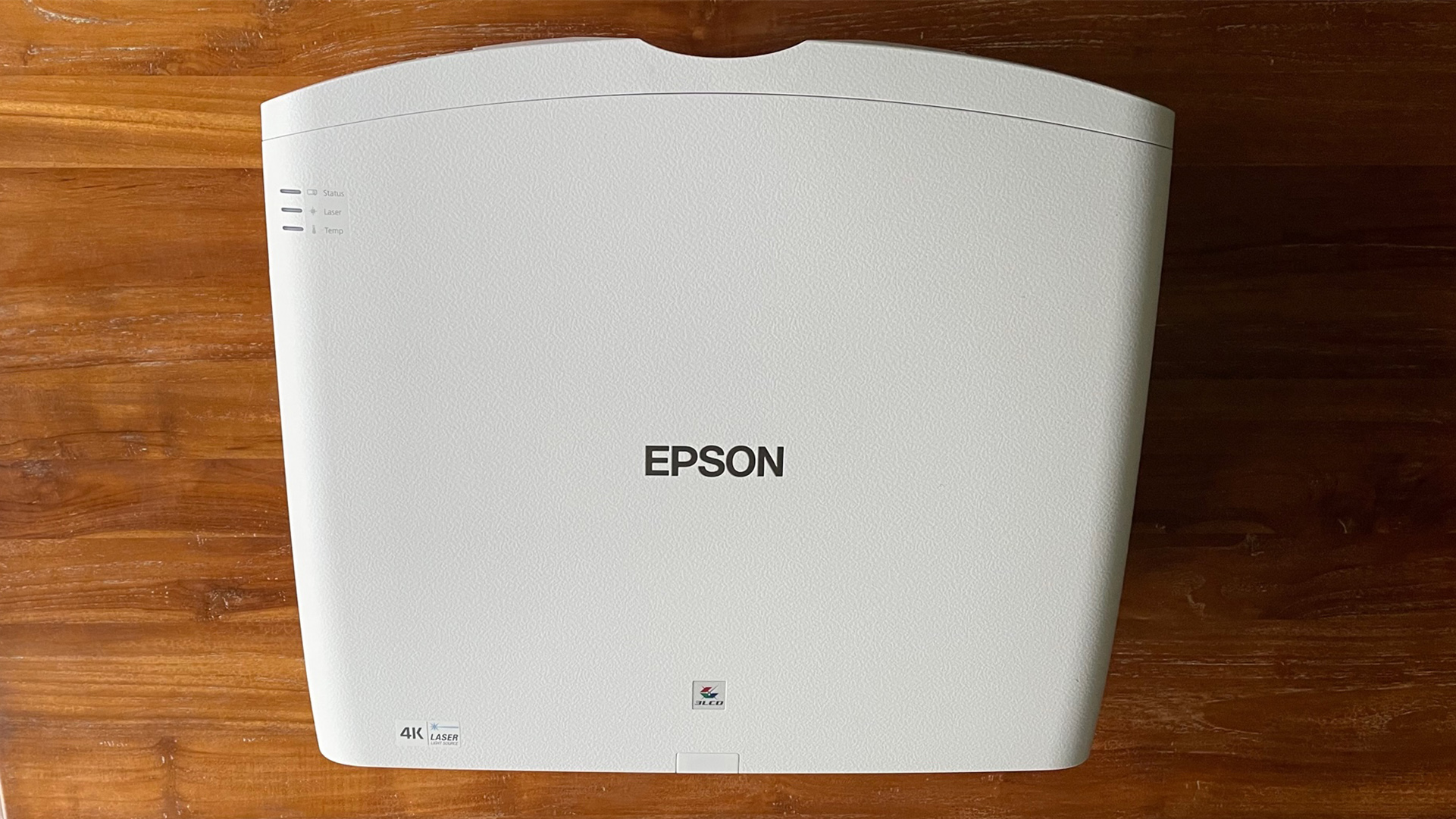
There’s a lot to like about the EH-LS11000W. Epson has a long and distinguished record of producing not just some of the best LCD projectors but some of the best home theatre projectors period, and that experience hasn’t all vanished in an instant with its latest HDR-munching giant.
As with many of its peers at the moment, though, the LS11000W doesn’t quite find a way to reconcile the quest for more brightness created by the arrival of HDR, and the convincing black levels and darkness that movie fans always crave.
So while with bright scenes the LS11000W can look spectacularly good (better, in fact, than you’d expect for its current price), it can’t retain that quality consistently enough throughout a typical film to earn an unqualified recommendation.
SCORES
- Picture 4
- Design 4
- Features 4
MORE:
Read our review of the Epson EH-LS12000B
Also consider the Xgimi Horizon Ultra
Read our BenQ W4000i review







